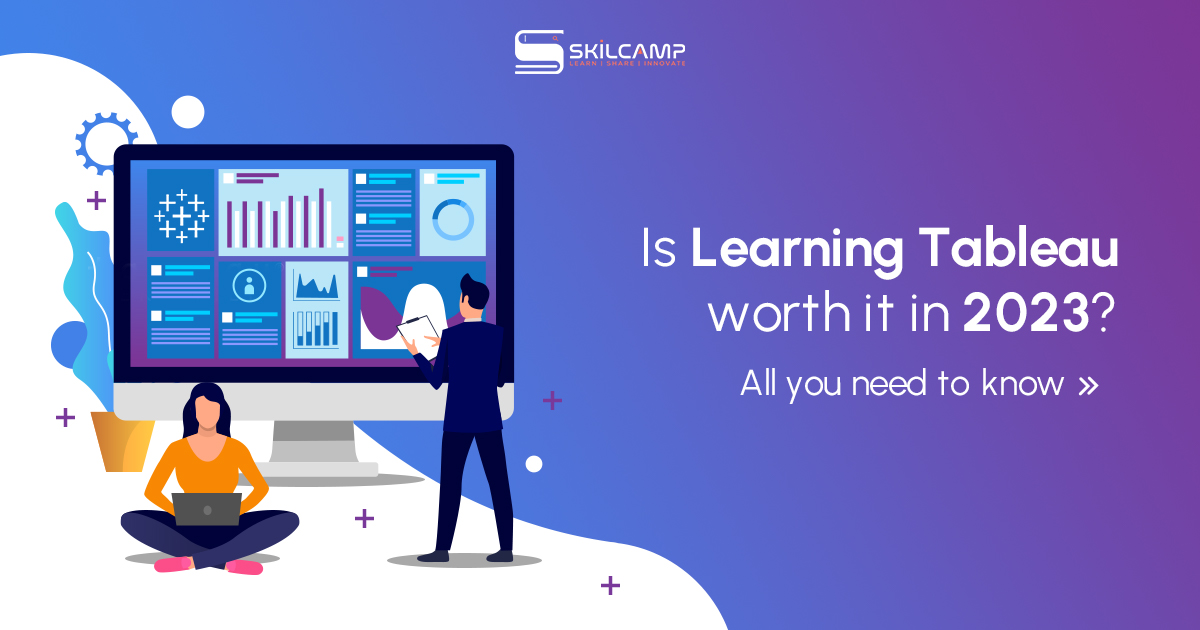Table of Contents
Tableau is a business intelligence and data visualization platform that helps analyze and display information in an engaging and informative manner. It provides several dashboards, charts, and graphs to help businesses examine and comprehend their data. Tableau’s straightforward design and drag-and-drop interface make it simple for anybody to explore, display, and share data. But, the question that remains is learning tableau worth it for you?
In recent years, Tableau has found increasing use in a wide range of industries, including banking, healthcare, retail, and more which makes learning tableau worth it. By doing so, businesses are able to better understand their data, which in turn leads to better business decisions. Tableau is useful for businesses who want to use their data to get an edge in the market because of its adaptability and a vast choice of data source connectivity options.
The need for analytical platforms like Tableau will only increase as data assumes an ever-greater role in decision-making. It’s a powerful resource with the ability to completely alter how businesses analyze and display their data.
Is learning tableau worth it? The Answer is Yes!
| 1 | No experience is required to start learning |
| 2 | A best friend to a data analyst |
| 3 | Enhances visualization and helps put your point across easily |
| 4 | Career growth and stability as it’s used across borders |
| 5 | Helps in the overall growth of an organization |
Powerful tools to analyze and show this data is in high demand as data production rises. Tableau’s purpose is to aid businesses in understanding their data and drawing conclusions that lead to more informed and effective decision-making. Further cracking the question – Is learning tableau worth it? Tableau is an adaptable tool for data analysis and visualization since it can connect to many different kinds of data sources, from simple spreadsheets to sophisticated cloud-based databases.
● The scope of a career in the domain is large.
A career in Tableau may take you in many directions, and qualified candidates have several options to choose from. The following are examples of some of the most sought-after professions:
Tableau is an invaluable resource for data analysts looking to get significant insights from their data and communicate those findings in a visually compelling format.
In order to assist businesses in making informed choices, business intelligence developers use Tableau to build dashboards, generate reports, and design various visualizations.
Experts in data visualization create interactive dashboards and representations in Tableau to aid businesses in making sense of their data.
Data scientists examine massive datasets using Tableau to glean actionable insights that improve decision-making.
● The app is used worldwide
Tableau is a data analysis and visualization tool used by businesses of all sizes and in a myriad of sectors throughout the globe. Companies in the retail sector use Tableau to analyze consumer data, boost marketing and sales initiatives, and streamline supply chain processes. Government agencies also make use of it to examine information about public health, education, and other areas of interest.
● The app is employed across industries
Indeed, Tableau is used in many different sectors, making it a popular and sought-after data analysis and visualization platform. Because of its flexibility and the variety of data sources it can connect to, Tableau is useful to businesses of all sizes and in all fields. Professionals of varying levels of experience may benefit from the software’s intuitive design and ability to show data in an attractive visual format.
Read more this blog : Career Opportunities in Digital Marketing
5 Reasons To Learn Tableau
Here are some answers to whether is learning tableau worth it.
● No experience is required to start learning
Tableau’s intuitive design allows for its usage by professionals of all skill levels, even those with no experience in data analysis at all. To aid users in both getting started and progressing in their education, it provides a wealth of materials, such as online courses and discussion boards.
● A best friend to a data analyst
Tableau, a sophisticated tool, is a data analyst’s best friend since it allows them to quickly and easily draw conclusions from massive datasets, spot trends, and display data in an attractive visual style. Because of this, sharing results and making data-driven choices is simplified. Tableau is a powerful tool for data analysts because of its many sophisticated features, such as predictive analytics and machine learning.
● Enhances visualization and helps put your point across easily
Tableau’s visualization capabilities are unparalleled, making it simple to show information in a manner that is readily understood by others. Data may be explored in real-time and patterns can be discovered using Tableau’s interactive representations. Because of this, it is a great resource for businesses that want to base their judgments on facts.
● Career growth and stability as it’s used across borders
Tableau is utilized in the financial sector, the healthcare sector, retail, government, and the technology sector, providing many opportunities for professional development and long-term job security. This implies that being proficient with Tableau may lead to improved job prospects and greater professional advancement. Professionals who are proficient in Tableau might expect to earn a greater salary than their counterparts who are not. Learning Tableau can open doors to various industries and enhance job prospects and earning potential.
● Helps in the overall growth of an organization
Tableau’s ability to assist businesses in making data-driven choices may ultimately contribute to the expansion of a company. By gaining proficiency with Tableau, you may play a pivotal role in your company’s progress toward its objectives and in the increasingly data-driven environment in which it operates. Organizations may save time and dollars by using Tableau to expedite data analysis and visualization.
Recommend Tableau Course: Comprehensive Tableau Course By Skilcamp
Top 3 Applications of Tableau
● Data visualization
Tableau is a popular data visualization tool because it facilitates the creation of charts, graphs, and other visual representations that may be used to convey information quickly and clearly. It provides several different ways to display data for analysis, such as bar charts, line charts, scatter plots, and heat maps. To better examine and comprehend their data, users may modify and interact with these visuals in real time.
● Real-time data analysis
Tableau’s real-time data analysis features make it a valuable resource for businesses that must act swiftly on the insights gleaned from their data. Real-time analysis using Tableau’s ability to link to several data sources in different formats (such as databases, spreadsheets, and cloud data services) may provide useful insights into a company’s inner workings.
● Easy to interpret data for everyone
Because of Tableau’s intuitive design, users of all skill levels may quickly get insight from the company’s data. If your company wants to make data-driven choices, this is crucial. With Tableau, businesses can effortlessly engage and communicate with all members of the team via the use of interactive graphics that can be understood by non-technical users.
How Tableau Helped in Analyzing Covi-19 Trends
To better understand the spread of the COVID-19 epidemic and assist organizations in their response efforts, Tableau has been used extensively. Some of Tableau’s contributions in this area make us understand why is learning tableau worth it.
1. Information Display
The propagation of the infection, as well as the number of fatalities and the number of people who have recovered, can be tracked in real-time thanks to Tableau dashboards and visualizations. These graphics simplify the analysis of the pandemic’s effects and aid in the planning of appropriate solutions.
2. Instantaneous Observation
Due in large part to Tableau’s real-time data analysis features, the spread of COVID-19 and its effects on diverse demographics and geographical areas can be monitored and assessed with unprecedented precision. This has enabled swift action to be taken by organizations in the face of epidemics, helping to contain the infection.
3. Analytic Prediction
Modeling the spread of COVID-19 and forecasting future patterns have both been accomplished with the use of Tableau’s predictive analytics capabilities. This has allowed businesses to better plan for future epidemics and assess the efficacy of various responses.
4. Cooperation and Mutual Assistance
Sharing dashboards and visualizations with Tableau has helped businesses work together and disseminate data to a wider audience, such as policymakers and healthcare professionals. Better cooperation and communication in the fight against the epidemic have resulted from this.
Tableau’s real-time insights, predictive analytics, and collaboration features have been invaluable in the battle against the COVID-19 epidemic, making the software a must-have for any business seeking to react swiftly and effectively to the outbreak.
In the end, yes, the market for Tableau is growing and learning it will add to your portfolio no matter your domain. So, start learning today and the first step towards it is picking the right course.
All the best!
FAQs
1. Which languages does tableau support?
Tableau is available in a plethora of languages, including English, French, German, Japanese, Brazilian Portuguese, Spanish, and simplified Chinese. The Dutch, Italian, Russian, and Korean languages are also partially supported in Tableau. Some functionality, however, may be unavailable in these translations.
2. How long does it take to master tableau?
Learning Tableau may be completed in anywhere from a few days to a few weeks, depending on variables like the learner’s background in data visualization and analysis, their daily study habits, and the quality of the materials they utilize. Two to three weeks of dedicated study is about normal for getting up to speed with Tableau. However, months may pass while you study and experiment with the more complex options.
3. Can I start from scratch and learn tableau?
There is no need for previous knowledge of Tableau to begin learning it. To assist you to get up and running with Tableau, the company offers a wealth of educational materials, like tutorials, training videos, and a detailed online support system. In addition, there are several discussion boards and blogs where you may get answers to your problems and make connections with other people who are also studying Tableau. However, it can help to have some familiarity with data analysis and visualization principles. Learning Tableau can be made easier with these resources and a basic understanding of data analysis.




Leave a Reply